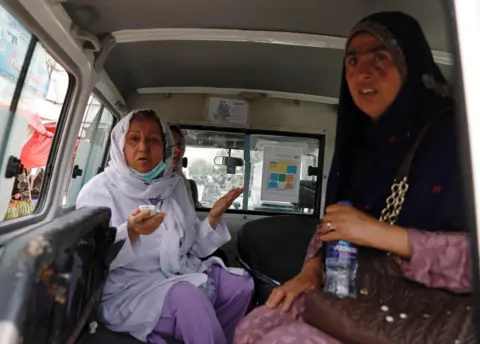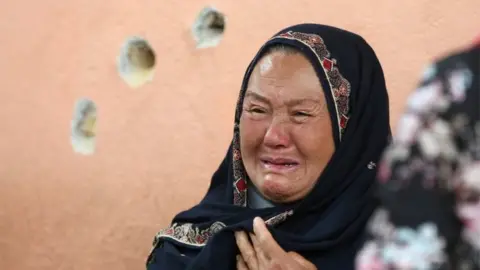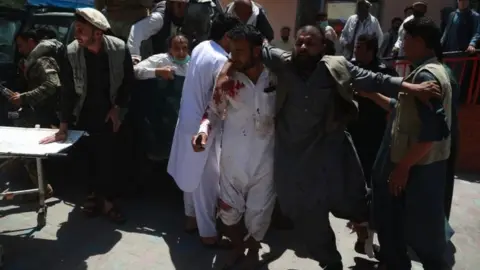Afghan attack: Maternity ward death toll climbs to 24
The number of people who were killed in a militant attack on a maternity ward in the Afghan capital has risen to 24.
Mothers, newborn babies and nurses were among the victims. At least 16 people were injured, the health ministry said.
Tuesday's attack in Kabul prompted widespread condemnation. No group has said it carried it out.
In a second incident that day, a suicide bomber killed at least 32 people at a funeral in Nangarhar, in the east of the country.
President Ashraf Ghani has ordered the resumption of offensive operations against the Taliban and other groups.
He accused the militants of ignoring repeated calls for a reduction in violence.
Warning: Some readers may find details in this story upsetting
The Islamic State (IS) group said it was behind the attack on the police commander's funeral in Nangarhar.
It is still not clear who carried out the attack at the Dasht-e-Barchi hospital in Kabul, and the Taliban have denied any involvement.
Allow X content?
Nineteen babies have been taken to safety in a children's hospital in the city but many of their mothers are feared to be dead.
In all, about 100 people were killed in violence around Afghanistan on Tuesday, the New York Times said. The attacks underline the fragility of peace efforts, and have dimmed hopes for an end to decades of war.
What happened at the hospital?
Locals describe hearing two blasts then gunfire at the start of the attack at about 10:00 (05:30 GMT) on Tuesday. About 140 people were in the hospital at the time, one doctor who escaped told the BBC.
The maternity ward in the hospital is run by the international medical charity Médecins sans Frontières (MSF) and some of those working there were foreigners.
 EPA
EPA"Total panic" took hold as the assault unfolded, another doctor told AFP news agency.
Ramazan Ali, a vendor who saw the attack begin, told Reuters news agency: "The attackers were shooting at anyone in this hospital without any reason."
One mother gave birth during the attack, MSF was quoted as saying by AFP news agency.
Another woman called Zainab had given birth just before the attack, Reuters reports. She named her baby boy Omid, which means "hope" in Dari, because it had taken her years to conceive.
Alerted by the commotion as she was visiting the washroom, the new mother rushed back to find her child of four hours, her hope of seven years, dead.
"I brought my daughter-in-law to Kabul so that she would not lose her baby," said Zahra Muhammadi, Zainab's mother-in-law, in her grief. "Today we'll take his dead body to Bamiyan."
Afghan special forces rescued 100 women and children, including three foreigners, an official told the BBC. The three attackers, who reportedly had gained access dressed as police officers, were all killed by security personnel.
Images from the scene showed soldiers carrying newborn babies swaddled in blood-stained blankets to safety.
Have hospitals been attacked before?
In the past, similar attacks in this mostly Shia Muslim area of the capital have been attributed to IS which, like the Taliban, is Sunni Muslim.
The IS leader in South Asia and the Far East was arrested in Kabul on Monday along with two other high-profile members, Afghan intelligence said.
 Reuters
ReutersIn 2017, IS gunmen disguised as medical staff attacked Kabul's main military hospital, prompting widespread shock and anger and raising questions about security. The authorities later confirmed about 50 people had been killed.
But the Taliban also attack hospitals. Last September, 20 people died after a truck packed with explosives was detonated by militants from the group outside a hospital in southern Zabul province.
On TV, Mr Ghani said: "In order to provide security for public places and to thwart attacks and threats from the Taliban and other terrorist groups, I'm ordering Afghan security forces to switch from an active defence mode to an offensive one and to resume their operations against the enemies."

Fragile hope shaken

Even in a country which has seen the worst of the worst, this savage attack on newborn babies and their mothers has shocked, and shaken fragile hope this would be the year Afghanistan would finally start to turn towards peace.
Images of special forces in bulky body armour, carrying infants to safety, will remain long in the memory of those who have repeatedly called for a ceasefire - especially when Afghans are battling another deadly enemy in Covid-19.
Despite Taliban denials that this ghastly attack was their work, President Ghani's denunciation reflects the anger and frustration of many. Some worry that groups like Islamic State, trying to drive an even greater wedge between Taliban and the government, have also killed for now what were slow uncertain steps toward peace talks.
And for those who have never trusted the Taliban's commitment, this latest attack solidifies their resolve to keep fighting.

How has the world reacted?
Tuesday's attacks were widely condemned by countries around the world and human rights groups, with Amnesty International saying: "The unconscionable war crimes in Afghanistan today... must awaken the world to the horrors civilians continue to face."
 Reuters
Reuters"Who attacks newborn babies and new mothers? Who does this?" tweeted Debra Lyons, the head of the UN mission in Afghanistan.
US Secretary of State Mike Pompeo said: "Any attack on innocents is unforgiveable, but to attack infants and women in labour... is an act of sheer evil.
"Terrorists who attack mourners lining up for prayer at a funeral are only seeking to tear apart the bonds that hold families and communities together, but they will never succeed."
According to survivors, thousands of people had gathered for the funeral in Nangarhar, and the bomb detonated about half-way through. Casualty figures have been rising since first reports of the bombing. Officials now say 133 people were injured.
 EPA
EPAMeanwhile, in northern Balkh province, at least 10 people were killed and many others injured in an air strike by US forces, reports said. Residents and the Taliban claimed the victims were all civilians, but the Afghan Defence Ministry said all those killed were militants.
What's going on with Afghan peace talks?
Since a February troop withdrawal agreement signed between the US and the Taliban, talks between the Afghan government and the Taliban have broken down over a prisoner swap and violence has continued unabated.
The agreement was aimed at ending more than 18 years of war since US-led forces ousted the Taliban from power following the 9/11 attacks on the US, whose mastermind Osama Bin Laden had been given sanctuary by the hardline Islamist group.
Tens of thousands of people, most of them civilians, have been killed in the conflict. Many more have been injured or displaced from their homes.
